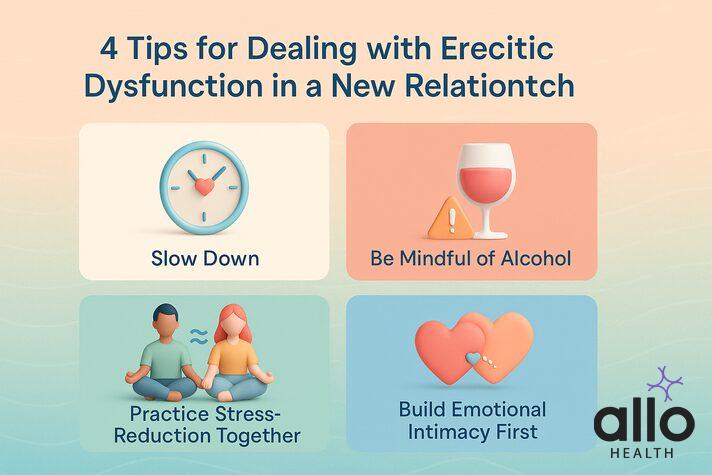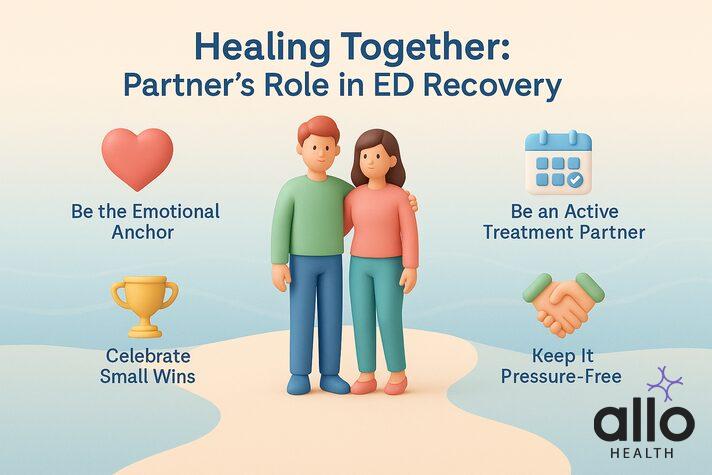Dealing Impotence with Your Partner: How Erectile Dysfunction Affects Relationships and What to Do About It

Dealing with erectile dysfunction in a new relationship is surprisingly common, affecting up to 25% of men due to performance anxiety and the natural stress of being intimate with someone new. The key to managing ED successfully lies in slowing down intimacy, focusing on emotional connection over performance, and approaching it as a team challenge rather than an individual problem. Simple strategies like limiting alcohol, practicing stress-reduction techniques together, and expanding your definition of intimacy beyond penetration can make a significant difference. Remember that ED is a treatable medical condition with multiple effective solutions – from lifestyle changes to medical treatments – and couples who communicate openly and work together consistently achieve the best outcomes for both their sexual health and overall relationship satisfaction.
Dealing with erectile dysfunction in a new relationship is more common than you might think, and it doesn’t have to damage your bond. From understanding triggers like performance anxiety and stress, to learning how to communicate openly and explore treatment options together, this article walks you step-by-step through managing ED as a team.
You’ll discover medical solutions, lifestyle tips, and emotional support strategies that can help you overcome this challenge and build a relationship based on trust, intimacy, and mutual understanding.
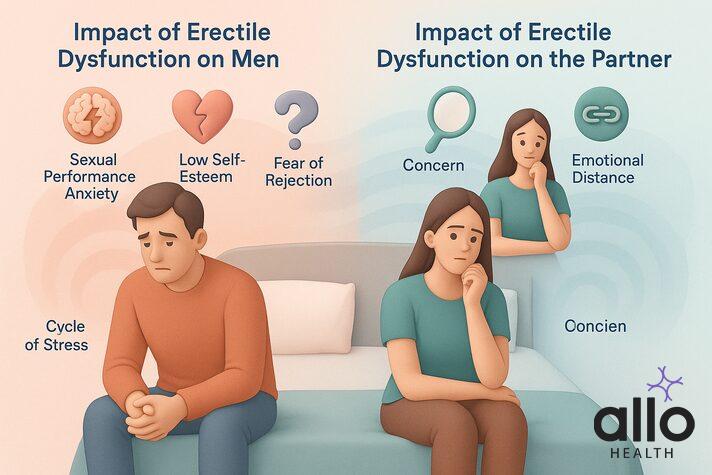
How ED Affects Relationships
Impotence, or erectile dysfunction, doesn’t just affect a man’s ability to have sex; it can ripple through the entire sexual relationship. It can influence emotional connection, self-esteem, and even day-to-day communication. When ED appears, both partners often find themselves navigating unfamiliar territory.
Impact of Erectile Dysfunction on Men
For many men, ED can trigger a wave of difficult emotions- embarrassment, frustration, and sometimes the painful feeling of not being “complete.” Achieving and maintaining an erection is often tied to a sense of sexual identity and confidence, so when this changes, it can have a big emotional impact.
Men may experience:
- Sexual Performance anxiety before sexual activity creates a cycle of stress that can make ED worse.
- Low self-esteem and reduced confidence may lead to depression, social withdrawal, and avoiding sex life altogether.
- Fear of rejection if they share what they’re going through with their sexual partners, making honest sexual conversation harder.
- Doubts about reassurance, research shows that while men may initially feel comforted by words like “It doesn’t matter to me,” over time, they may find them harder to believe.
Erectile Dysfunction Effect on the Partner
While ED happens in one partner’s body, the emotional effects are often felt by both. Partners may feel confused, concerned, or even rejected.
- Some question their attractiveness or worry they are somehow to blame.
- Studies[1] show that around 40% of women think their partner’s ED is their fault, even though over 80% of ED cases are linked to physical or medical causes.
This emotional strain and sexual difficulties can lead to misunderstandings and distance if it’s not addressed openly.
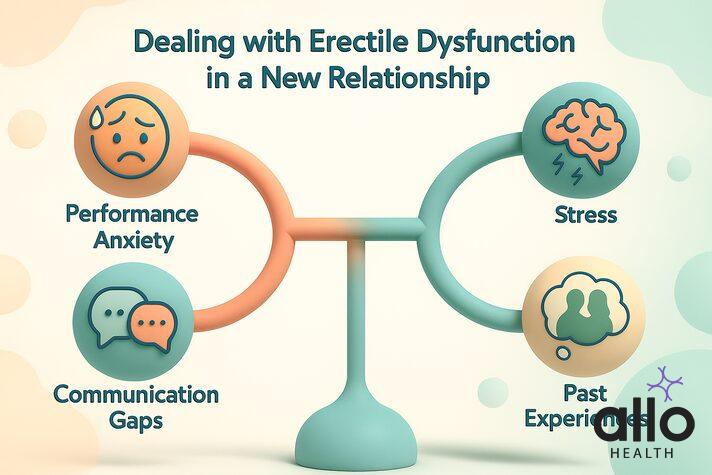
Dealing with Erectile Dysfunction in a New Relationship
Experiencing erectile dysfunction (ED) in a new relationship is remarkably common and often referred to as “honeymoon impotence” or “honeymoon syndrome.” Several factors contribute to ED in new relationships:
Performance Anxiety:
- Sexual performance anxiety affects 9-25% of men and 6-16% of women, making it one of the most common sexual concerns.[2]
- The pressure to satisfy a new partner and the fear of disappointing them create intense psychological stress.
- Men worry about their sexual adequacy and whether they’ll measure up to expectations or past partners.
Stress:
Being intimate with someone new naturally creates anxiety, even in healthy individuals. This nervousness can interfere with the body’s natural sexual response.
External factors like work stress, financial concerns, or relationship uncertainty can impact sexual function.
Communication Gaps:
Lack of open communication about sexual expectations and needs can create misunderstandings and additional pressure.
Past Experiences:
Previous negative sexual encounters or performance issues can contribute to anxiety in new relationships.
Treating ED isn’t just about pills or devices. It’s about creating a safe space between partners, trying different approaches, and remembering that intimacy is more than just penetration.
4 Tips for Dealing with Erectile Dysfunction in a New Relationship
New relationships are exciting, but they can also be nerve-wracking, and that pressure can fuel performance anxiety. The good news? There are simple ways to make intimacy feel less stressful and more enjoyable.
1. Slow Down
Instead of rushing toward penetration sex, take time to explore through touch, kissing, and playful intimacy. This eases pressure and builds emotional connection.
2. Be Mindful of Alcohol
Limit yourself to one drink or skip it entirely. While alcohol may seem relaxing, it can interfere with blood flow and make ED worse.
3. Practice Stress-Reduction Together
Before getting intimate, try:
- Five deep breaths together.
- A couple of minutes of mindfulness or light stretching.
- Talking about something you’re looking forward to.
4. Build Emotional Intimacy First
Share experiences, laugh together, and be honest about your feelings. When emotional closeness grows, physical intimacy often follows more naturally.
Remember, great sex isn’t about perfect performance; it’s about two people who care for each other, exploring what feels good together.
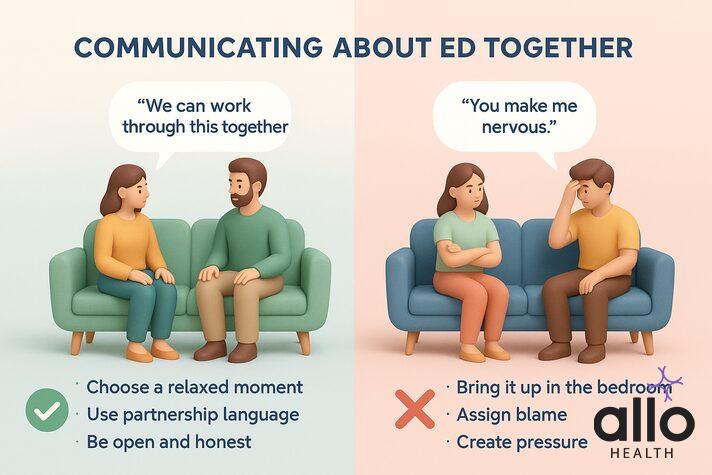
Dealing with Impotence in Marriage
ED is often considered a “couple’s condition.” It affects both partners and usually requires teamwork to overcome.
Research on wives’ adjustment to their husband’s ED reveals a complex transitional process involving several stages. For many married couples, this journey has four stages[3]:
- Broken Role Phase: ED changes husband’s usual sexual function, which can throw the relationship off balance and make communication harder.
- Ups and Downs: There are emotional highs and lows, moments of closeness, but also frustration, less intimacy, and ongoing worry.
- Trying Different Paths: Couples experiment with different solutions like medical treatments or sex therapy. Sometimes these help, sometimes they don’t.
- New Chapter (or Stuck in Place): Some couples come out stronger, with deeper intimacy, sexual health, and better communication. Others may still feel stuck in the same struggles.
“According to Allo Health’s internal clinical insights, based on the experiences of over 2.5 lakh patients, almost one in two men with erectile dysfunction also live with anxiety disorders.”
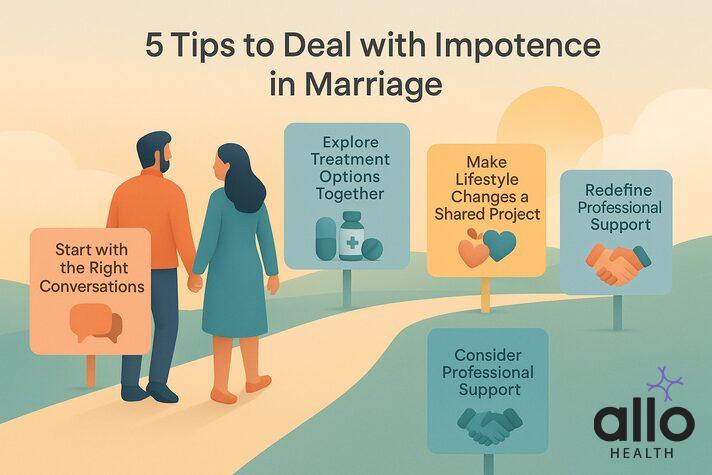
5 Tips to Deal with Impotence in Marriage
When erectile dysfunction (ED) enters a marriage, it’s easy to be overwhelmed. But it’s not the end of your intimate life. It can be the start of learning new ways to connect, communicate, and care for each other. Think of it less as “his problem” or “her problem” and more as our journey.
1. Start with the Right Conversations
The first step is to talk to each other, and timing matters. Don’t bring it up right after a difficult intimate moment or when one of you is stressed.
Instead, find a calm, private time, maybe over weekend coffee or a quiet evening walk, where you both feel comfortable and unrushed.
When you talk, lead with reassurance; this signals partnership, not blame. Be direct, but keep it gentle and, most importantly, normalize it. Nearly 40% of couples face ED by age 40. You’re far from alone.
2. Explore Treatment Options Together
The medical options for ED are better than ever, and when both partners are involved in learning and deciding, the results are often better.
- PDE5 inhibitors like Viagra, Cialis, and Levitra work for 70–80% of men. They’re even more effective when both partners understand how they work and approach them without stigma.
- Vacuum erection devices work for up to 90% of men and can take the pressure off performance when used together.
- For more persistent cases, injectable therapies and penile implants offer high success rates, implants have over 90% satisfaction[4], and these decisions are best made as a couple.
3. Make Lifestyle Changes a Shared Project
This is where being married becomes a superpower. Lifestyle changes that improve ED are easier (and more fun) when you do them together.
- Daily movement: A 30-minute walk can cut ED risk by 41%. Walking together turns it into quality time.
- Eating Healthy: Fruits, vegetables, fish, and whole grains can improve ED symptoms. Cooking together can be intimate in its own way.
- Manage weight together: Being overweight increases ED risk by 50%. Supporting each other in healthier habits can be game-changing.
- Quit smoking: Erectile function can improve within months, and doing it together boosts your chances of success.
4. Redefine Intimacy
One of the healthiest shifts you can make is expanding your idea of what intimacy means. Research shows emotional closeness often matters more than intercourse alone.
- Sensate focus exercises remove performance pressure and build connection.
- Oral and manual stimulation using sex toys can be fulfilling on their own and may even improve blood flow later.
- Non-sexual touch like cuddling, holding hands, and kissing releases oxytocin and keeps you close. Little daily rituals like morning coffee or bedtime chats add emotional glue.
5. Consider Professional Support
Sometimes the best move is getting expert guidance. Couples therapy combined with medical treatment can be more effective than either alone.
- Couples-focused CBT[5] helps reframe thoughts about intimacy and reduce anxiety.
- Sex therapy gives you practical tools and techniques you can use right away[6].
How to Help Your Partner with Erectile Dysfunction
Couples who face ED together consistently see better results than those who leave it to one person alone.[7]
-
Be the Emotional Anchor
Don’t take it personally, ED is a medical issue, not a reflection of attraction. Offer steady reassurance: “We’ll figure this out together.” This creates emotional safety that can actually help erectile function.
-
Be an Active Treatment Partner
Attend medical appointments together, understand treatment options, and participate in changes.
-
Celebrate Small Wins
Acknowledge progress, even if it’s not perfect, partial improvements, or enjoyable moments without penetration sex are still successes worth noting.
-
Keep It Pressure-Free
Shift the focus from performance to shared pleasure and connection. When pressure is removed, sexual response often returns naturally.
Final Takeaway
Erectile dysfunction is not the end of the relationship. How to deal with erectile dysfunction in a relationship can be a daunting question, but the answer to this can open new doors in the relationship.
Openness about suffering from ED, support from a partner, and teamwork can go a long way in the treatment of erectile dysfunction.
"The following blog article provides general information and insights on various topics. However, it is important to note that the information presented is not intended as professional advice in any specific field or area. The content of this blog is for general educational and informational purposes only.
Book consultation
The content should not be interpreted as endorsement, recommendation, or guarantee of any product, service, or information mentioned. Readers are solely responsible for the decisions and actions they take based on the information provided in this blog. It is essential to exercise individual judgment, critical thinking, and personal responsibility when applying or implementing any information or suggestions discussed in the blog."



